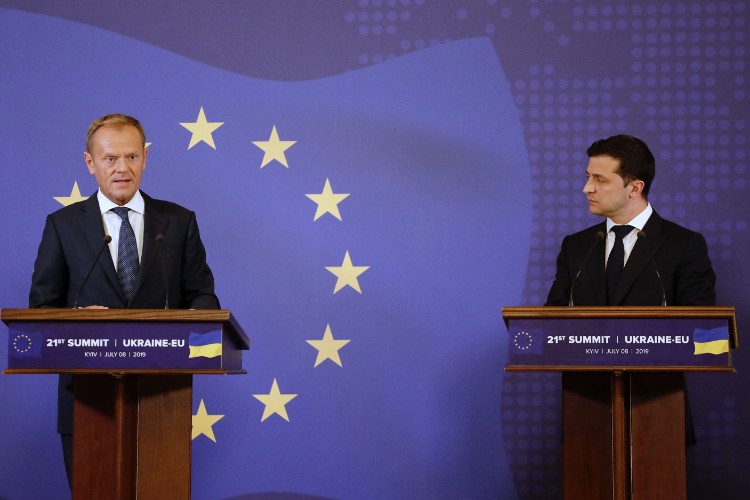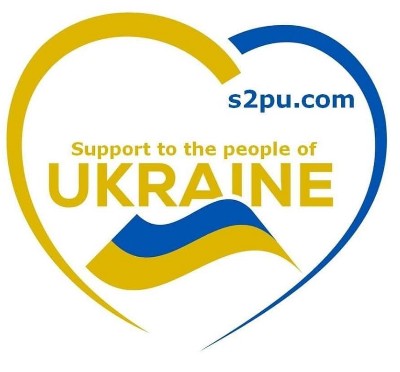The EU has told Russia that sanctions will stay in place until it stops waging war in east Ukraine.

EU Council president Donald Tusk (l) spoke with Volodymyr Zelenskiy (r) after visiting east Ukraine (Photo: consilium.europa.eu)
"We reiterated our strong condemnation of the clear violation of Ukrainian sovereignty and territorial integrity by acts of aggression by the Russian armed forces since February 2014," the EU and Ukraine said in a joint statement after a summit in Kyiv on Monday (8 July).
"Let me once again confirm the EU's unwavering support for Ukraine's territorial integrity, sovereignty and independence," outgoing EU Council president Donald Tusk also told press in the Ukrainian capital.
"Only a few days ago, the EU unanimously extended the economic sanctions against Russia for another six months. The sanctions will remain in place until the Minsk agreements are fully implemented," he added, referring to a 2015 ceasefire accord which calls on Russia to extract its forces from its EU-aspirant neighbour.
"We do not and will not recognise the illegal annexation of Crimea and Sevastopol by Russia," he also said.
Tusk spoke after visiting the contact line in east Ukraine, where five years of simmering warfare has claimed more than 13,000 lives.
Russia denies having its soldiers there, but Ukrainian officials and EU diplomats say that some 11,000 of the 32,000 fighters in the Russia-occupied regions are Russian regular and irregular combatants.
These include "Russian officers, from the top down to the level of brigades and individual regiments. There are Russian officers also in some specialised units, such as radio-electronics, military intelligence, and logistics," Serhiy Nayev, the head of Ukrainian ground forces in the region told EUobserver on a visit to the region earlier this year.
Tusk said "Russia has a particular responsibility" for stopping the fighting.
He also said "we expect Russia to make full use of its considerable influence over the separatists" - the other 21,000 local fighters whom it has recruited - to end the war.
"Our challenge is to defend the pro-European spirit in Ukraine and the pro-Ukrainian spirit in Europe," Tusk said.
The council chief spoke alongside European Commission president Jean-Claude Juncker and Ukrainian president Volodymyr Zelenskiy, a former TV comic, who took office in May.
For his part, Zelenskiy promised to continue the fight against corruption inside Ukraine - the main stumbling block, alongside Russian opposition, on forging closer EU ties.
"This is the de-shadowing of the economy, the creation of an independent court, the elimination of monopolies, the fight against raiding and smuggling," he said.
"Geographically, Ukraine is the centre of Europe. I will do everything for Ukraine to become such a centre economically and mentally," he added.
Enlargement fatigue
The summit statement said little on Ukraine's EU accession prospects at a time of growing enlargement fatigue in France and the Netherlands among other EU states.
"We acknowledged the European aspirations of Ukraine and welcomed its European choice," it noted.
It also promised a joint "commitment to strengthening the political association and economic integration of Ukraine with the European Union".
And it said Ukraine ought to remain "a strategic transit country for gas" flows from Russia to the EU even though Germany and Bulgaria are planning to build new pipelines to help Russia bypass Ukraine after 2019.
Juncker said the EU had pledged a further €120m or so in aid, on top of the €15bn in European assistance which Ukraine has received since 2014.
The €120m is to be spent on: administrative decentralisation ; anti-corruption reforms; helping NGOs; support for trade integration; and relief for war-torn regions in the east.
But a further €500m of macro-financial assistance remains on hold pending fiscal reforms.

Comments powered by CComment